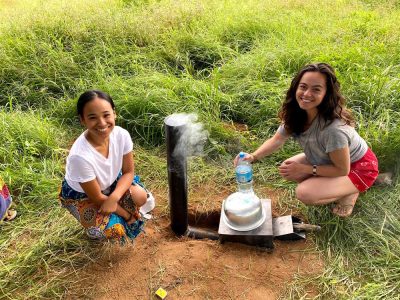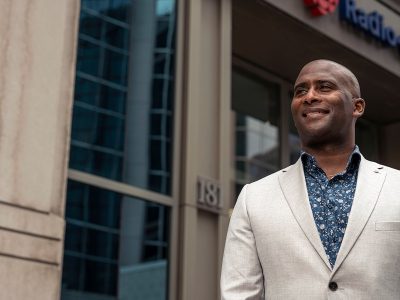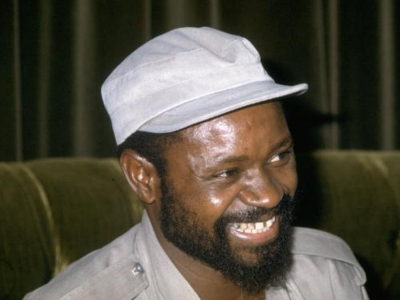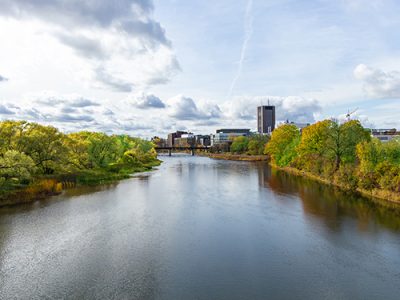By Jane van den Dries
As Carleton University global and international studies student Jordan Gray prepares to graduate this month, he reflects on what he describes as a long and interesting road.
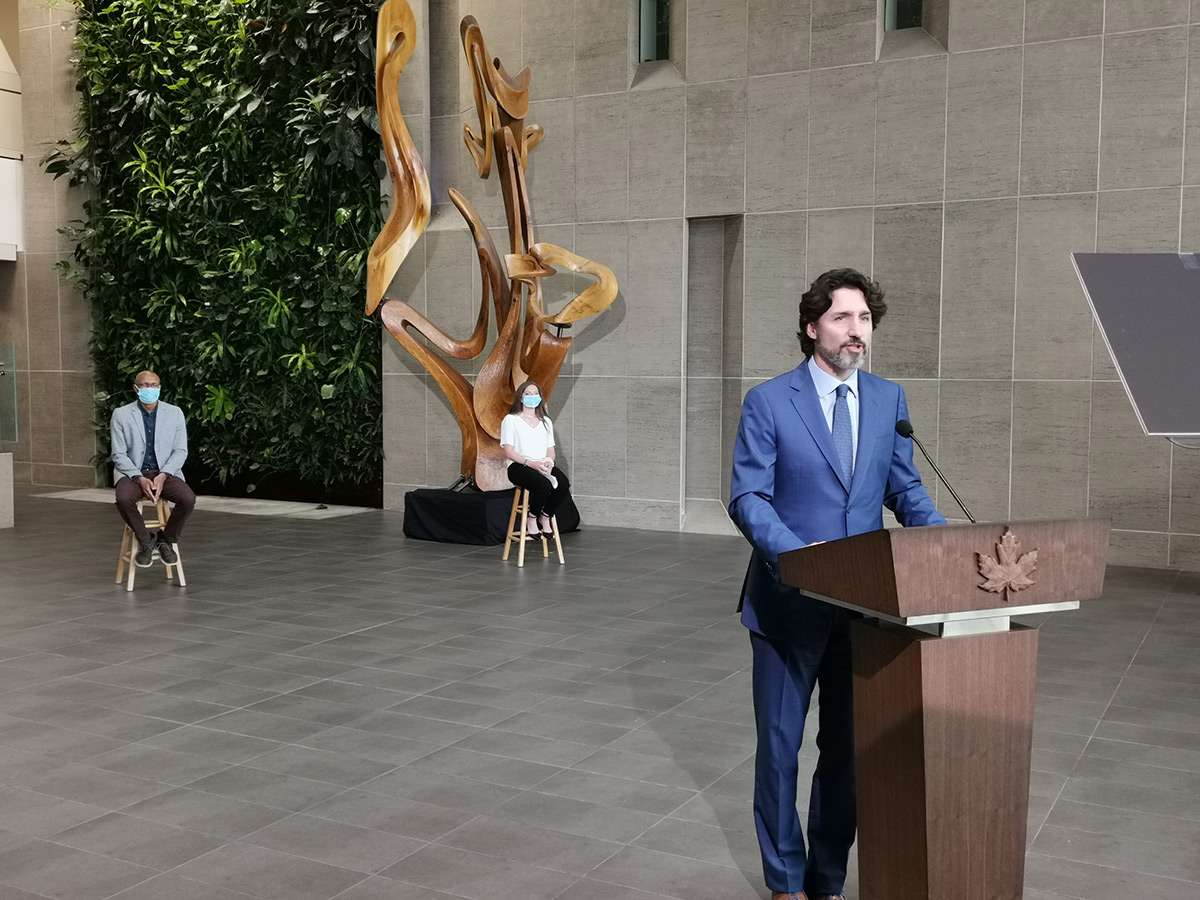
Prime Minister Justin Trudeau visited Carleton’s campus to addresses graduating post-secondary students across Canada on June 10, 2020. He was accompanied by graduating Carleton student Jordan Gray, and University of Toronto student Lana El Sanyoura, who both delivered remarks to their peers across the nation. (Photo: Mike Pinder)
Throughout his undergraduate career, Gray has completed 10 major research projects, seven of which he presented at conferences, five of which were outside Canada.
“I didn’t set out to do 10 major research projects,” said Gray.
“I did what I believed in. I’m so glad that I decided to think deeper, to go further. I had professors who challenged my ideas and helped me articulate them.”
Later this month, Gray will graduate with honours with a specialization in global and transnational history and a minor in Indigenous studies as part of the second graduating cohort of the global and international studies (BGInS) program. The unique program has provided him with international experiences, research opportunities and a chance to learn alongside some of the country’s most respected historians.
“This program allowed me to take a global lens to history,” said Gray. “I could take an interdisciplinary approach by taking courses in subjects like history, law and economics and study how they all intersect.”
Peter J. Ricketts Outstanding Provost Scholar Award Winner
Last month, Gray was awarded the Peter J. Ricketts Outstanding Provost Scholar Award in recognition of his research accomplishments and contributions to community engagement. The award is named for Peter Ricketts, who served as Carleton’s Provost for eight years. The recipient of this award is chosen by the Provost from among the recipients of the Provost Scholar Award, which is given to undergraduate students who have demonstrated outstanding achievements in research, community engagement, immersive learning and/or international activities.
“Jordan is an impressive and accomplished student who has already made significant contributions to his field of study, which is truly an outstanding undergraduate achievement,” said Carleton Provost and Vice-President (Academic) Jerry Tomberlin. “He has shown the very best of student leadership and I have no doubt that he has an exceptionally bright future ahead of him.”
Prof. Dominique Marshall (History), who accompanied Gray’s work in two courses and one research project, nominated him for the award.
“It has been a pleasure to see Jordan make connections between courses, disciplines, places and persons,” she said.
“My courses all benefited from his curiosity, initiative and attention, as well as his wish to use new knowledge make sense of the world around him.”
A Transformative Experience
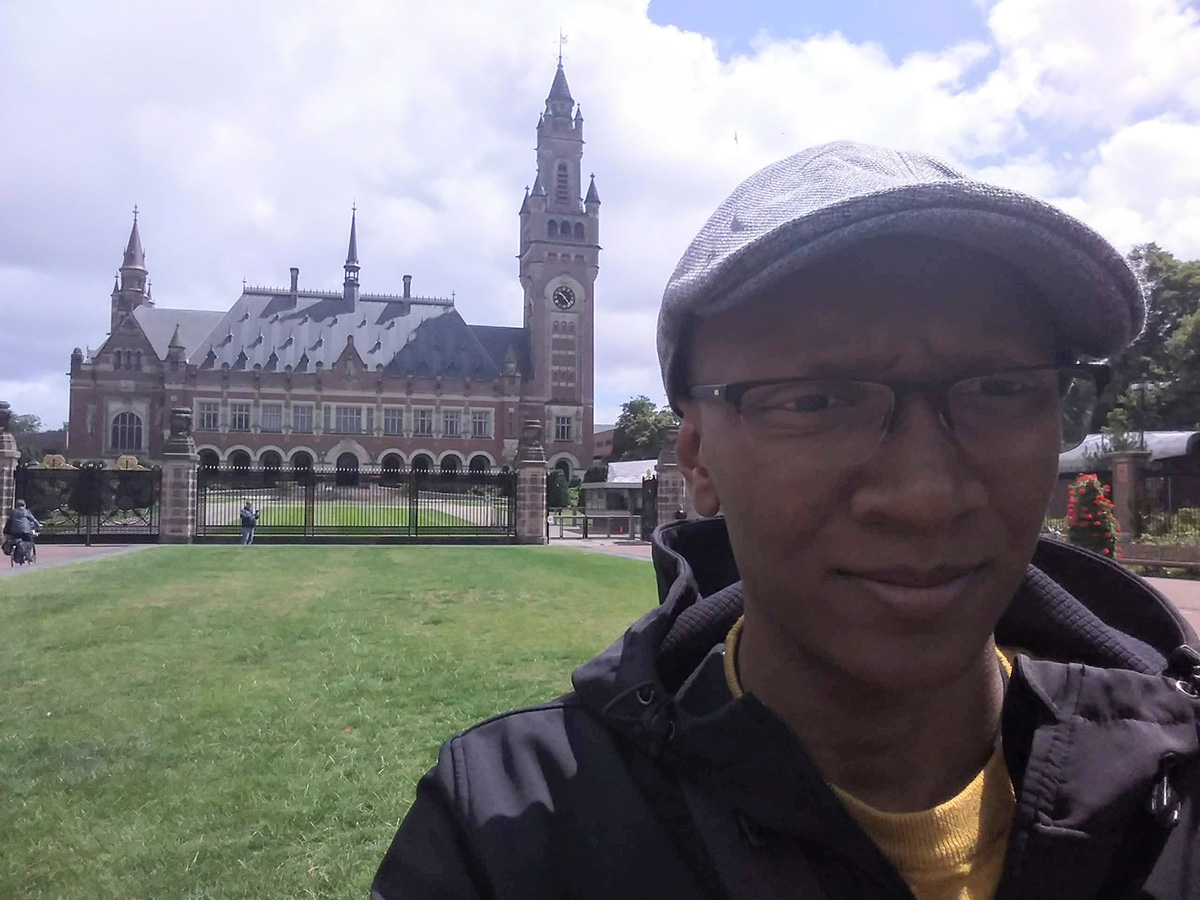
Jordan Gray visited the International Court of Justice in the Peace Palace when he traveled to the Hague in the Netherlands as part of an international law course taught by Prof. Kamari Clarke.
At the end of his second year, Gray spent more than two weeks in the Hague in the Netherlands—the international law capital of the world—in Prof. Kamari Clarke’s international law course.
“It was eye opening,” said Gray.
“We were learning about the law and justice and applying it in real time. We learned that there is always conflict between law and justice. I was interested in where the law finds its human side.”
The experience proved to be transformative for Gray, who used the knowledge he had gained to drive additional research projects when he returned to campus.
“I took this dichotomy of law and justice when I came back to Carleton and it changed the way I looked at things,” said Gray. “I realized that what I had been observing my entire life had deep historical ideological underpinnings.
“The past transcends time and place to exist in the here and now, and this inspired me to apply my training in the discipline of history to the realities of social injustice, such as Indigenous peoples’ land disputes with the federal government.”
Studying Indigenous Knowledge and Land Claims
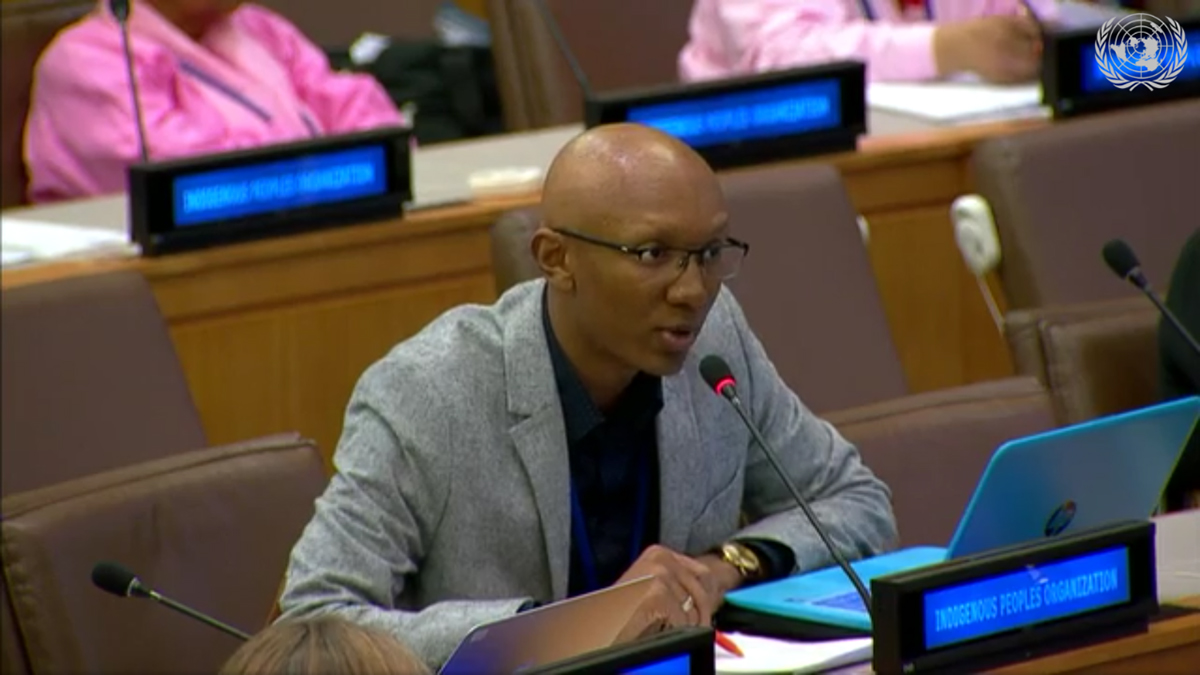
In April 2019, Jordan Gray spoke on Indigenous conservation policy at the UN Permanent Forum on Indigenous Issues before a session convened by the President of United Nations General Assembly.
Driven by this inspiration, Gray began a research project that focused on land claim disputes between the Government of Canada and Indigenous communities in the North.
“I found that when Indigenous communities articulated their traditions, they did not fully translate to common law,” said Gray.
“This went back to what we had learned in the Hague: you can’t deliver justice in a system that can’t properly deliver the law. Justice can’t be delivered after the fact. If atrocities happen, then justice has failed.” Gray then went on to work with Prof. John Kelly, part of Carleton’s Centre for Indigenous Research, Culture, Language and Education, on a project that focused on how Indigenous knowledge is articulated in international systems.
Gray’s research on Indigenous knowledges and land claims was then featured at the United Nation’s Forum on Indigenous Issues in April 2019 where he spoke about the disconnect in how Indigenous rights are articulated in the international system by using conservation to reappropriate land.
“When systems themselves are not developed with everybody in mind, that means the system will always be able to be used against people for whom they have not been developed,” said Gray.
Research with International Impact
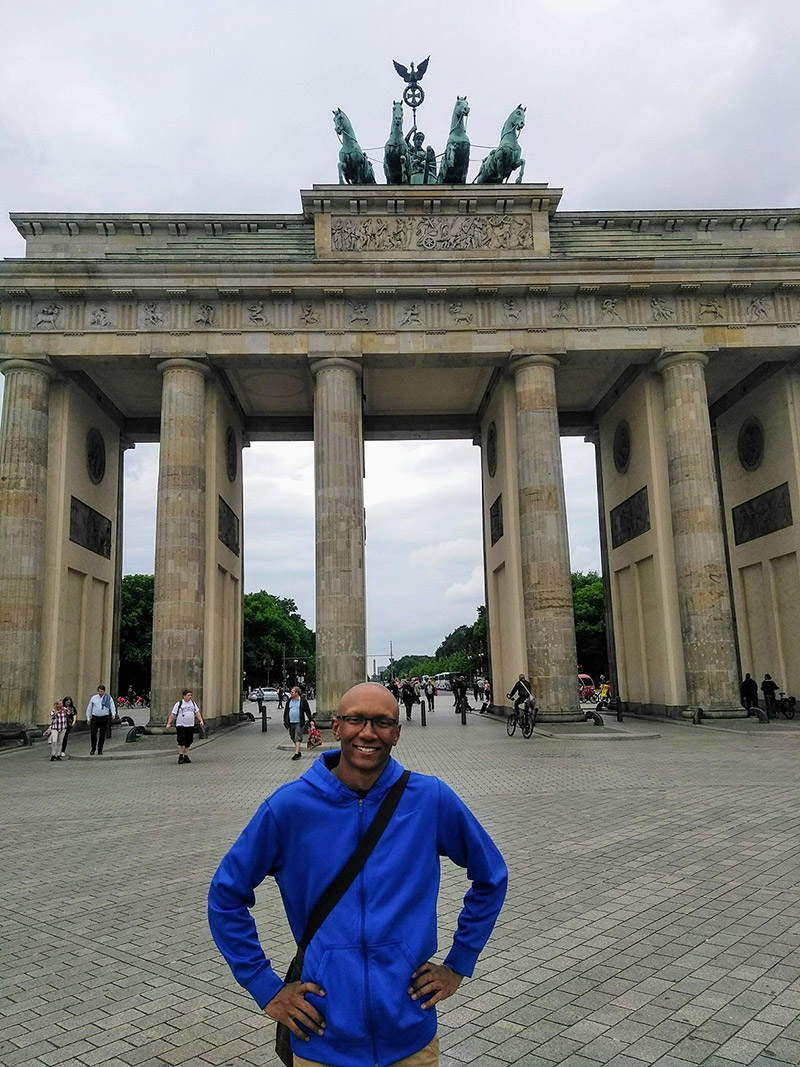
Jordan Gray was the first Carleton student to attend the World Congress on Undergraduate Research in Germany.
Gray worked on several other research projects, including a transnational carbon emissions environmental study with Prof. Dominique Marshall (History) in collaboration with the John F. Kennedy Institute for North American Studies at Germany’s Freie Universität Berlin.
After the research project concluded, Gray continued his relationship with the institute where he undertook an independent research study on how the liberal international system could be rethought to structurally accommodate Indigenous Nations in decisions that impact them. Two years later, he met his
Freie Universität Berlin peers in person when he became the first Carleton student to attend the World Congress on Undergraduate Research, hosted at the University of Oldenburg in Germany.
A New Decade
This past year, Gray also served as a student representative on Carleton’s Strategic Integrated Plan Task Force, which was brought together to help form Carleton’s next strategic plan.
“I saw it as an opportunity to be at the forefront of a new plan and a new decade, how we are going to be doing things differently,” said Gray.
“I was looking at what would be my next act, and I saw this as an opportunity to tap into everything that I had learned in my four years at Carleton.”
The Strategic Integrated Plan was approved by Carleton’s Senate and Board of Governors earlier this month.
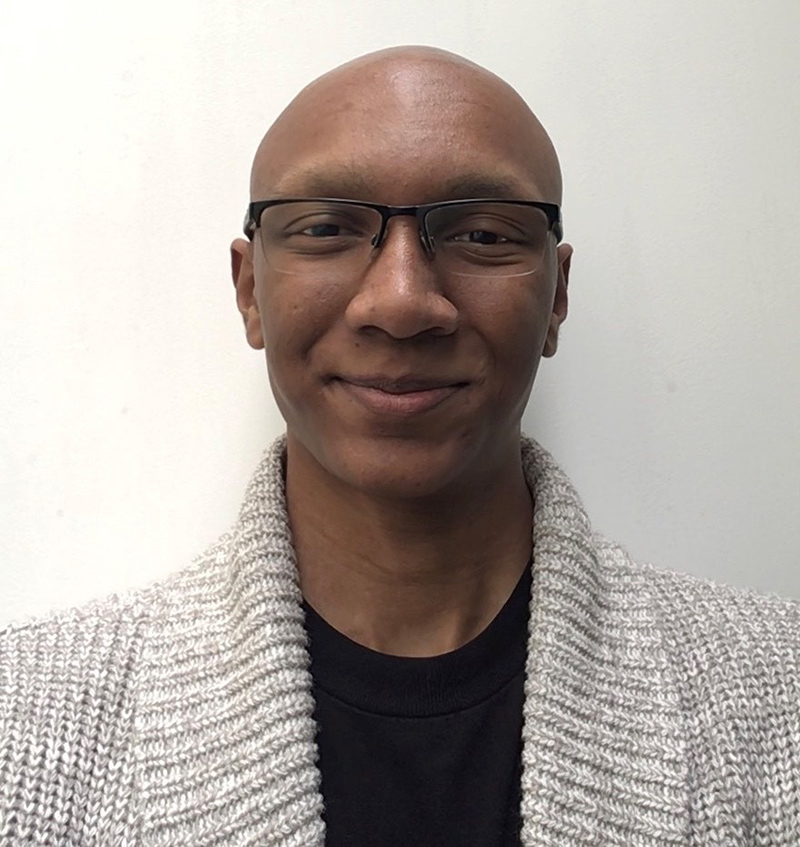
Global and International Studies student Jordan Gray
Looking to the Past for a Better Future
Gray now works as a historical advisor for Crown-Indigenous Relations and Northern Affairs Canada where he analyzes comprehensive land claims in Northwest Territories between the Crown, the Government of Canada and Indigenous communities.
“My job is to study history of the land use in the Northwest Territories and, wish Indigenous partners, provide evidence-based policy recommendations to the government on how to advance reconciliation with Indigenous peoples,” said Gray. “What a role! Our analysis of the past has an immediate impact on the present.”
The role is a perfect fit for Gray, who already has an impressive track record in historical research.
“Through my research, I get to articulate not only where those ideas come from, but how they are playing out in real time,” he said. “For me, articulating how historical ideology influences our world today is a powerful tool in making positive societal change and is where research meets activism.”
Wednesday, June 10, 2020 in Faculty of Arts and Social Sciences, Faculty of Public and Global Affairs, International
Share: Twitter, Facebook
